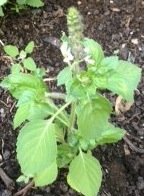Terrific Tulsi

In Hindi, the word ‘Tulsi’, means, ‘incomparable plant’, and the name is very appropriate, for this humble plant is an incredible multi-tasker!! Tulsi (Ocimum sanctum) is held in the highest regard in India; most homes have one of these plants growing right outside their door, or as a potted plant within the home. In the Hindi religion, it is literally revered; in fact, its species name, sanctum, means ‘holy’. It is used for medicinal, and religious purposes, and is considered to be an elixir of life, one that promotes longevity, and good health.
On closer examination, this reverence is understood more easily. It has scores of medicinal applications, being beneficial to virtually every system in the body, including the immune system, the nervous system, the cardiovascular system, the pulmonary system, and the renal system.
Tulsi, or Holy Basil, as it is also known (a close relative to culinary basil) is well known as an adaptogenic (a plant which is known to help the body adapt to stress.) Having powerful anti-stress properties, it helps the body normalize cortisol levels (the stress hormone) and therefore helps to soothe frayed nerves. In addition, as stress is known to create free radicals (unpaired molecules which wreak havoc with the health of our cells) it is also beneficial that Tulsi is high in antioxidants, which help to stabilize these disease-causing free radicals.
As excessive stress often goes hand-in-hand with high blood pressure, it makes sense that Tulsi would also help to lower blood pressure, and, due to a powerful component called eugenol, it does just that. In addition, it protects the heart; by keeping blood pressure under control, and by lowering cholesterol, it helps to protect against heart disease.
A significant amount of research has been done in regard to the fact that Ocimum sanctum stabilizes blood sugar levels. This is important news for diabetics, for in some types of diabetes, it has been shown to be an effective medicine. This action is also good news for those desiring to lose weight, for in addition to stabilizing blood sugar levels (spiked blood sugar levels are associated with obesity and weight gain) it also increases metabolism.
Due to its powerful essential oil constituents, camphene, cineol, and eugenol, Tulsi is an amazing immune-booster; it has anti-bacterial and anti-fungal properties that help beat a variety of infections. Also, it is an anti-inflammatory, and an analgesic, and is commonly used to help lower fever. Also, it has anti-tussive properties, is an expectorant, and relieves congestion, making it a very effective medicine for respiratory illness, in particular.
Tulsi is also well known to help to detoxify the kidneys; it is a diuretic, and helps to remove excessive uric acid in the blood. As excessive uric acid levels are known to be associated with kidney stones, this plant therefore helps to prevent, and can even help to dissolve, kidney stones. And, as clean blood and healthy kidneys make for healthy skin, Tulsi also helps give us a radiant complexion.
Natives of India often chew leaves directly from the plant, as well as using it as a tea. In addition, juice is extracted, and used medicinally, as well. In the US, it is commonly taken as a tea, a tincture, or as a pill. There are several good quality brands that produce Tulsi teas, making it is easy to incorporate into our daily routine! So do yourself a favor, and drink up!

Jackie Callahan has been interested in health and nutrition for her entire adult life. She is an amateur naturalist and has written over 13 illustrated journals on the flora and fauna of Fish Creek, an outlet of Saratoga Lake, and is currently studying with master herbalist, Dr. Aviva Romm, working toward a certification as an herbal educator. She works as a sales associate in the Healthy Living (Saratoga) Wellness department. She lives in Saratoga Springs on beautiful Fish Creek with her husband, John and their son, Alex. She also has two grown children, Danielle and Devin, who live in Marblehead, Massachusetts, and Burlington, Vermont, respectively.



